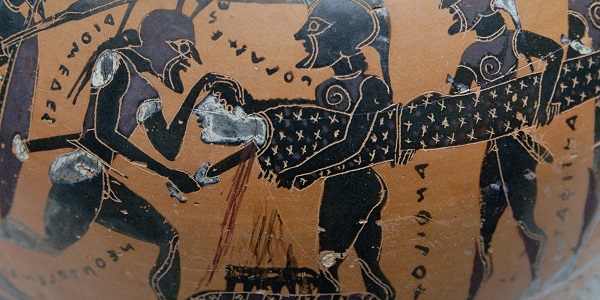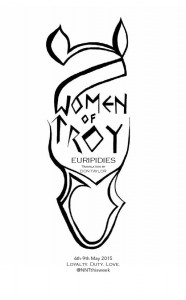
April 24, 2015, by Oliver Thomas
Women of Troy
Lynn Fotheringham previews an imminent production of Euripides’ play at the University’s student theatre.
A recent conversation I had with sisters Page and Eden Philips Harrington, director and producer of the New Theatre’s forthcoming production of Women of Troy (6th-9th May), revealed their creative ideas for dealing with the difficulties of putting on a Greek tragedy for a modern undergraduate audience. But the genre also turns out to have some unexpected positives.
 One is the gender-balance of the roles available in a Greek play with a female chorus. The New Theatre membership includes twice as many women as men, but most modern plays have more male than female roles. Eden, who is also on the New Theatre committee, explains: “We can only choose from the plays that the membership have proposed to us. But we have to think about it; so we wouldn’t put on A Clockwork Orange and The History Boys in the same season.” Page says that putting on Women of Troy means this is the first year ever when the theatre has offered more female roles than male.
One is the gender-balance of the roles available in a Greek play with a female chorus. The New Theatre membership includes twice as many women as men, but most modern plays have more male than female roles. Eden, who is also on the New Theatre committee, explains: “We can only choose from the plays that the membership have proposed to us. But we have to think about it; so we wouldn’t put on A Clockwork Orange and The History Boys in the same season.” Page says that putting on Women of Troy means this is the first year ever when the theatre has offered more female roles than male.
The gender-balance wasn’t the only reason they chose the play (“this is a great show”), nor did it mean that the production was a shoo-in with the committee. The sisters’ proposal, which they started planning seriously in September for the February proposals round, included detailed information about their approach: to staging, to the gods, to the chorus, to the setting, … It’s important with any ‘classical’ play (including Shakespeare), Eden explains, to have a strong interpretation, as well as a good reason for doing this play at this point in time – and “women at war is a big subject at the moment.”
Page and Eden are enthusiasts for Greek plays, having worked on several for school Drama exams. Maybe this prior experience has given them the courage to take on Euripides when there hasn’t been a Greek drama ‘in house’ at the New Theatre for several years. They agreed that there are problems with people’s preconceived notions of what tragedy is like: “it isn’t just a 3-hour Greek ramble.” In fact, the pace of the translation they’ve chosen (by Don Taylor, whose television productions of Greek drama I am currently researching) is snappy, and the translation itself modern and conversational, both funny and moving. The running time is under an hour and half (no interval). This may help with the traditionally difficult Friday-evening sales at the theatre, since it will be possible to take in the show and still have plenty of time to go out!
Classicists will be pleased to learn that they are keeping the prologue with the gods, which Katie Mitchell cut for the 2007 National Theatre production. I’m not going to give away how they’re going to do this, or any other details of the production which they so generously shared with me, as I promised this blog-post would be a spoiler-free zone… I’ll just say that our conversation has me really looking forward to this production. Next week, I get to attend a rehearsal!
Images:
Top: Timiades Painter, the sacrifice of Polyxena, from British Museum 1897,0727.2 (c.560 BC). Photo (c) M-L. Nguyen, licensed via Wikimedia Commons.
Middle: Poster for the production.

I hope we’ll be making a Cadre trip to see it (and it’s on when I’m there)!